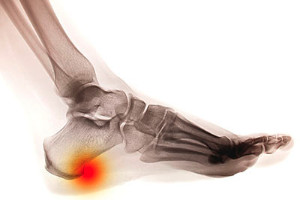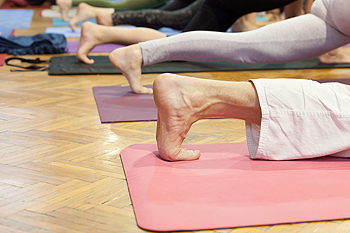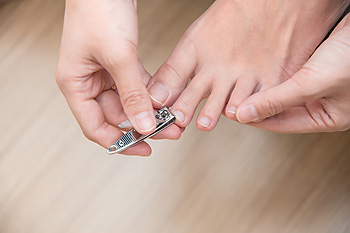Items filtered by date: April 2019
Symptoms of a Heel Spur
 If a calcium deposit should forms between the arch of your foot and your heel, you may have a heel spur. This protrusion may grow gradually, and can be have a hooked, pointed, or even "shelf-like" appearance. Symptoms associated with this condition may include swelling, sharp pains in the heel and surrounding areas, or tenderness that is felt under the heel. If muscle and ligament strain damage the soft tissue in the heel, the result may the formation of a heel spur. Additionally, as the aging process occurs, the heel pads may not provide adequate shock absorption. The symptoms of heel spurs may be similar to those of plantar fasciitis, so it is advised to seek the counsel of a podiatrist who can properly diagnosis this condition.
If a calcium deposit should forms between the arch of your foot and your heel, you may have a heel spur. This protrusion may grow gradually, and can be have a hooked, pointed, or even "shelf-like" appearance. Symptoms associated with this condition may include swelling, sharp pains in the heel and surrounding areas, or tenderness that is felt under the heel. If muscle and ligament strain damage the soft tissue in the heel, the result may the formation of a heel spur. Additionally, as the aging process occurs, the heel pads may not provide adequate shock absorption. The symptoms of heel spurs may be similar to those of plantar fasciitis, so it is advised to seek the counsel of a podiatrist who can properly diagnosis this condition.
Heel spurs can be incredibly painful and sometimes may make you unable to participate in physical activities. To get medical care for your heel spurs, contact Dr. Joshua David Scoll from Pennsylvania. Our doctor will do everything possible to treat your condition.
Heels Spurs
Heel spurs are formed by calcium deposits on the back of the foot where the heel is. This can also be caused by small fragments of bone breaking off one section of the foot, attaching onto the back of the foot. Heel spurs can also be bone growth on the back of the foot and may grow in the direction of the arch of the foot.
Older individuals usually suffer from heel spurs and pain sometimes intensifies with age. One of the main condition's spurs are related to is plantar fasciitis.
Pain
The pain associated with spurs is often because of weight placed on the feet. When someone is walking, their entire weight is concentrated on the feet. Bone spurs then have the tendency to affect other bones and tissues around the foot. As the pain continues, the feet will become tender and sensitive over time.
Treatments
There are many ways to treat heel spurs. If one is suffering from heel spurs in conjunction with pain, there are several methods for healing. Medication, surgery, and herbal care are some options.
If you have any questions feel free to contact one of our offices located in Philadelphia, Bensalem, and Fairless Hills, PA . We offer the latest in diagnostic and treatment technology to meet your needs.
Daily Foot Care for Diabetic Patients
 Diabetic patients have to be concerned about cuts and bruises that appear on the feet. Infections may rapidly occur as a result of an impaired healing response. This may be due to nerve damage that may affect diabetic patients, and it may be difficult to sense if there is an open wound on the foot. It is important for these patients to check their feet daily, and this may help them become aware of any existing cuts on the feet. This can be accomplished by washing and drying the feet thoroughly and following by applying a moisturizer on the bottom of the feet. Additionally, if the toes can be seen and easily reached, it is important to learn how to properly trim the toenails. If this becomes difficult to perform, it is advised to be under the care of a podiatrist who can trim toenails correctly and offer additional daily foot care procedures.
Diabetic patients have to be concerned about cuts and bruises that appear on the feet. Infections may rapidly occur as a result of an impaired healing response. This may be due to nerve damage that may affect diabetic patients, and it may be difficult to sense if there is an open wound on the foot. It is important for these patients to check their feet daily, and this may help them become aware of any existing cuts on the feet. This can be accomplished by washing and drying the feet thoroughly and following by applying a moisturizer on the bottom of the feet. Additionally, if the toes can be seen and easily reached, it is important to learn how to properly trim the toenails. If this becomes difficult to perform, it is advised to be under the care of a podiatrist who can trim toenails correctly and offer additional daily foot care procedures.
Diabetic foot care is important in preventing foot ailments such as ulcers. If you are suffering from diabetes or have any other concerns about your feet, contact Dr. Joshua David Scoll from Pennsylvania. Our doctor can provide the care you need to keep you pain-free and on your feet.
Diabetic Foot Care
Diabetes affects millions of people every year. The condition can damage blood vessels in many parts of the body, especially the feet. Because of this, taking care of your feet is essential if you have diabetes, and having a podiatrist help monitor your foot health is highly recommended.
The Importance of Caring for Your Feet
- Routinely inspect your feet for bruises or sores.
- Wear socks that fit your feet comfortably.
- Wear comfortable shoes that provide adequate support.
Patients with diabetes should have their doctor monitor their blood levels, as blood sugar levels play such a huge role in diabetic care. Monitoring these levels on a regular basis is highly advised.
It is always best to inform your healthcare professional of any concerns you may have regarding your feet, especially for diabetic patients. Early treatment and routine foot examinations are keys to maintaining proper health, especially because severe complications can arise if proper treatment is not applied.
If you have any questions please feel free to contact one of our offices located in Philadelphia, Bensalem, and Fairless Hills, PA . We offer the newest diagnostic and treatment technologies for all your foot and ankle needs.
Practicing Yoga May Benefit the Feet
 As the weather gets warmer, many people enjoy spending time outdoors. When the feet are properly stretched, aches and pains in the feet may diminish, and this can help to make daily activities more enjoyable. Research has indicated that practicing yoga may be beneficial in developing balanced alignment in the feet, which may positively affect the overall health of the body. Additionally, when proper stretching techniques are implemented, the healing process may be accelerated in existing foot conditions. One particular stretch, called "weaving," may be helpful in finding mild relief from an aching bunion. This is achieved by weaving your fingers through the toes on the opposite foot, creating space between them. If you would like additional information about the benefits of stretching the feet, it is suggested that you speak to a podiatrist.
As the weather gets warmer, many people enjoy spending time outdoors. When the feet are properly stretched, aches and pains in the feet may diminish, and this can help to make daily activities more enjoyable. Research has indicated that practicing yoga may be beneficial in developing balanced alignment in the feet, which may positively affect the overall health of the body. Additionally, when proper stretching techniques are implemented, the healing process may be accelerated in existing foot conditions. One particular stretch, called "weaving," may be helpful in finding mild relief from an aching bunion. This is achieved by weaving your fingers through the toes on the opposite foot, creating space between them. If you would like additional information about the benefits of stretching the feet, it is suggested that you speak to a podiatrist.
Stretching the feet is a great way to prevent injuries. If you have any concerns with your feet consult with Dr. Joshua David Scoll from Pennsylvania. Our doctor will assess your condition and provide you with quality foot and ankle treatment.
Stretching the Feet
Stretching the muscles in the foot is an important part in any physical activity. Feet that are tight can lead to less flexibility and make you more prone to injury. One of the most common forms of foot pain, plantar fasciitis, can be stretched out to help ease the pain. Stretching can not only ease pain from plantar fasciitis but also prevent it as well. However, it is important to see a podiatrist first if stretching is right for you. Podiatrists can also recommend other ways to stretch your feet. Once you know whether stretching is right for you, here are some excellent stretches you can do.
- Using a foam roller or any cylindrical object (a water bottle or soda can will do), roll the object under your foot back and forth. You should also exert pressure on the object. Be sure to do this to both feet for a minute. Do this exercise three times each.
- Similar to the previous one, take a ball, such as a tennis ball, and roll it under your foot while seated and exert pressure on it.
- Grab a resistance band or towel and take a seat. If you are using a towel, fold it length wise. Next put either one between the ball of your foot and heel and pull with both hands on each side towards you. Hold this for 15 seconds and then switch feet. Do this three times for each foot.
- Finally hold your big toe while crossing one leg over the other. Pull the toe towards you and hold for 15 seconds. Once again do this three times per foot.
It is best to go easy when first stretching your foot and work your way up. If your foot starts hurting, stop exercising and ice and rest the foot. It is advised to then see a podiatrist for help.
If you have any questions, please feel free to contact one of our offices located in Philadelphia, Bensalem, and Fairless Hills, PA . We offer the newest diagnostic and treatment technologies for all your foot care needs.
Important Ways to Care for Your Feet
One of the best ways to care for your feet is to wear shoes that fit comfortably. This may prevent unwanted foot conditions from developing, which may include bunions or hammertoe. Some patients may experience general foot pain, and taking a walk may help to stretch the muscles in the feet. The importance of washing and drying the feet daily may help to prevent fungal infections and unpleasant foot odor. Utilizing a good moisturizer will not only make the feet feel good, but aid in preventing cracked heels from developing. Additionally, the painful condition that is known as ingrown toenails may be less likely to develop if the toenails are properly trimmed. For more information on how to implement daily foot care routines, please consult with a podiatrist who can answer any questions you may have.
Everyday foot care is very important to prevent infection and other foot ailments. If you need your feet checked, contact Dr. Joshua David Scoll from Pennsylvania. Our doctor can provide the care you need to keep you pain-free and on your feet.
Everyday Foot Care
Often, people take care of their bodies, face and hair more so than they do for their feet. But the feet are a very important aspect of our bodies, and one that we should pay more attention to. Without our feet, we would not be able to perform most daily tasks.
It is best to check your feet regularly to make sure there are no new bruises or cuts that you may not have noticed before. For dry feet, moisturizer can easily be a remedy and can be applied as often as necessary to the affected areas. Wearing shoes that fit well can also help you maintain good foot health, as well as making it easier to walk and do daily activities without the stress or pain of ill-fitting shoes, high heels, or even flip flops. Wearing clean socks with closed shoes is important to ensure that sweat and bacteria do not accumulate within the shoe. Clean socks help to prevent Athlete’s foot, fungi problems, bad odors, and can absorb sweat.
If you have any questions please feel free to contact one of our offices located in Philadelphia, Bensalem, and Fairless Hills, PA . We offer the newest diagnostic and treatment technologies for all your foot and ankle needs.

